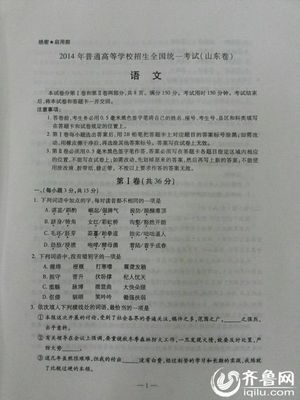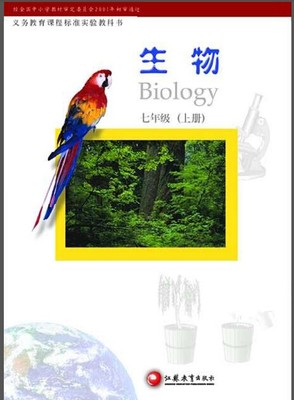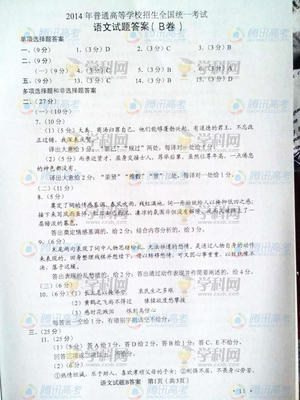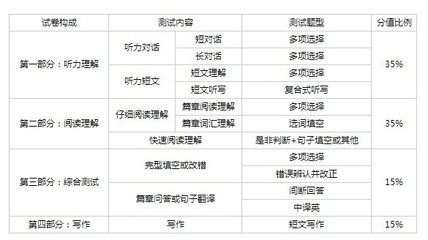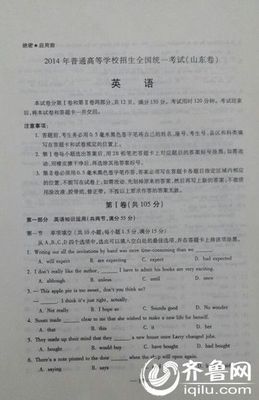
2014年山东省高考英语科考试说明
【博主提示】认真研究2014年高考命题形式及考试说明中的内容变化,准确把握高考动向。
Ⅰ.命题指导思想
一、命题依据中华人民共和国教育部2003年颁布的《普通高中英语课程标准(实验)》,依据《2014年普通高等学校招生全国统一考试大纲(课程标准实验版)》和《2014年普通高等学校招生全国统一考试山东卷考试说明》,不拘泥于某一版本的教科书。
二、命题重视”新材料、新情境”的创设与运用,考查考生的综合语言运用能力。
三、命题保持相对稳定,体现新课程理念。
四、命题力求科学、准确、公平、规范,试卷应有较高的信度、效度、必要的区分度和适当的难度。
Ⅱ.考试内容及要求
依据《普通高中英语课程标准(实验)》规定的八级目标要求,确定本学科考试内容。考生应在英语语言知识、语言技能、情感态度、学习策略和文化意识等方面达到相应水平。对语言知识、语言运用的具体要求如下:
一、语言知识
要求考生掌握并能运用《普通高中英语课程标准(实验)》八级要求规定的英语语音、词汇、语法、功能意念和话题(见附录)。结合山东省中学英语教学实际,确定约3300个单词(见附录)作为高考命题的词汇范围。另外,为命题的需要,增加了个别单词,以*号标明,仅要求考生知道其汉语意思。
二、语言运用
1.阅读
要求考生能读懂书、报、杂志中关于一般性话题的简短文段以及公告、说明、广告等,并能从中获取相关信息。考生应能:
(1)理解主旨和要义
(2)理解文中具体信息
(3)根据上下文推断生词的词义
(4)作出判断和推理
(5)理解文章的基本结构
(6)理解作者的意图、观点和态度
2.写作
要求考生根据题示进行书面表达。考生应能:
(1)清楚、连贯地传递信息,表达意思
(2)有效运用所学语言知识
3.口语(对2014年英语及相关专业考生的要求)
要求考生根据题示进行口头表达。考生应能:
(1)询问或传递事实性信息,表达意思和想法
(2)做到语音、语调自然
(3)做到语言运用得体
(4)使用有效的交际策略
Ⅲ.考试形式与试卷结构
考试形式:采用闭卷、笔试形式(英语及相关专业考生增加口试,办法另定)。考试限定用时为120分钟。
试卷结构:试卷分为第Ⅰ卷和第Ⅱ卷,满分150分。第Ⅰ卷为选择题,共105分;第Ⅱ卷为书面表达题,共45分。
第Ⅰ卷
第一部分 英语知识运用
本部分共两节,考查考生对英语语法、词汇知识和简单表达形式的掌握情况。
第一节:10小题,每小题1.5分,共15分。每小题在一句或两句话中留出空白,要求考生从每小题所给的4个选项中选出最佳选项。
第二节:共40分。在两篇短文中留出空白,要求考生从每小题所给的4个选项中选出最佳选项,使补足后的短文意思通顺、前后连贯、结构完整。第一篇短文10小题,每小题1分;第二篇短文20小题,每小题1.5分。
第二部分 阅读理解
考查考生阅读理解书面英语的能力。
本部分25小题,每小题2分,共50分。要求考生根据所提供短文的内容,从每小题所给的4个选项中选出最佳选项。
第Ⅱ卷
第三部分 书面表达
本部分共两节,考查考生用英语进行书面表达的能力。
第一节:5个小题,共15分。要求考生阅读所给的一篇短文,并根据短文作答。题目主要有以下几种类型:
1.根据题目要求就短文内容简要回答问题
2.概括短文或某一段落的主旨大意
3.确定具有指代功能的词汇的所指内容
4.指出作者的写作意图或态度
5.补全短文中空缺的内容
6.同义语句替换
7.根据语境翻译句子
必要时可根据文章的题材和体裁设置其他类型题目。
第二节:满分30分。要求考生根据题目的提示和要求,用英语写一篇120~150个单词的短文。
Ⅳ.题型示例
第一部分 英语知识运用
第一节 单项填空
1. Aftercompleting and signing it, please return the form to us in theenvelope _______.
A.providingB. provided
C. havingprovidedD. provide
2. I didn’t thinkI’d like the movie, but actually it ______ pretty good.
A. hasbeen B.wasC. had beenD. would be
3. — Are you goingto take part in the speech contest?
— _______ It’s toogood an opportunity to miss.
A. Noproblem!B. That’s for sure.
C. why me?D. Why bother?
4. When you aredone with the book, just give it to Lucy or Helen or_______.
A.whoeverB. wherever
C.whateverD. however
5. It doesn’tmatter _______ you pay by cash or credit card in thisstore.
A.howB.whether
C.whatD. why
6. Mark needs tolearn Chinesehiscompany is opening a branch in Beijing.
A.unlessB. untilC. althoughD. since
7. If weadequatepreparations, the conference wouldn’t have been sosuccessful.
A. haven’tmadeB. wouldn’t make
C. didn’tmakeD. hadn’t made
8. There is nosimple answer,isoften the case in science.
A. asB. thatC.whenD. where
第二节 完形填空
例一
In 1999, RyanHreljac and Jimmy Akana became pen pals. Their lives could not havebeen more1 .Ryan lived with his family in Kemptville, Canada, while Jimmy, anorphan, lived in Agweo, Uganda. Jimmy’s life was in constant2because rebel troops would raid his village.Fate, and Ryan’s3to help others, brought the palstogether.
When Ryan was 6,he 4that millions of people in Africa did not haveaccess to clean water. He decided to5that. To raise money, Ryan did chores for fourmonths. He earned $70, but that was not6to build even one well. “I realized that Icouldn’t raise $ 2,000 by doing chores,” he told TFK. “So I starteddoing public speaking.” To date, the Ryan’s Well Foundation hasbuilt 238 wells in 11 countries. “We’ve7almost 400,000 people and raised $ 1.5 million,”Ryan says.
The foundation’sfirst well was built in Agweo, where Jimmy lived. The boys met in2000, when Ryan traveled to Uganda. “We had a8from the beginning,” says Jimmy of that meeting.The Hreljac family9Jimmy and brought him to live in their home.Ryan, 15, and Jimmy, 17, speak to communities and schools all overthe world about the10of having clean drinking water.
1. A.differentB.difficultC. brilliantD. important
2. A.dangerB.absenceC.evidenceD. decline
3. A.determinationB.dutyC.guidanceD. burden
4. A.learnedB.estimatedC.hopedD. commanded
5. A.changeB.moveC.competeD. create
6. A.enoughB.supposedC.usualD. equal
7. A.helpedB.touchedC.removedD. examined
8. A.connectionB. storyC.focusD. fortune
9. A.adoptedB.informedC.pleasedD. purchased
10. A.importanceB.futureC.habitD. history
例二
I grew up in alittle village in England. Our father was astruggling1 , but I always knew hewasspecial.
Dad’s always beenvery 2. At 15, I started a magazine. Itwas 3a great deal of my time, and the headmaster of myschool gave me a4 : stay in school or leave to work on mymagazine. I decided to leave, and Dad tried to sway me from mydecision,as any good fatherwould. When he realized I had made up mymind,he said, “Richard, when I was 23, mydad 5 me to go intolaw. And I’vealways regrettedit. I wanted to be a biologist,6 I didn’t pursuemy 7 .You know what you want. Go fulfill it.”As 8 turned out, my littlepublication went on to become Student, anational 9for young people in theU.K.
My wife and I havetwo children, and I’d like to think we are bringing them up in thesame way Dad10 me.
1.A.teacherB.managerC.lawyerD. gardener
2.A.understandingB.experiencedC.seriousD. demanding
3. A. takingupB. makingupC. pickingupD. keeping up
4.A.suggestionB.decisionC.noticeD. choice
5.A.helpedB.allowedC.persuadedD. suggested
6.A.ratherB.butC.forD. therefore
7.A.promiseB.taskC.beliefD. dream
8.A.thisB.heC.itD. that
9.A.newspaperB.magazineC.programD. project
10. A.controlledB.comfortedC.remindedD. raised
例三
I used to be avery self-centered person, but in the past two years I have reallychanged. I have started to think about other people1I think about myself. I am happy that I ambecoming a 2person.
I think my3started when I was at Palomar College. At first,I just wanted to get my 4 and be left alone. I thought I was smarterthan everyone else, so I hardly ever5 to anyone in my classes. By the end of myfirst semester, I was really6. It seemed as if everyone but me had made friends and was havingfun. So I tried a(n)7. I started asking people around me how they were doing, and ifthey were having trouble I8to help. That was really a big9for me. By the end of the year, I had several newfriends, and two of10are still my best friends today.
A bigger cause ofmy new11 ,however, came when I took a part-time job at Vista Nursing Home.One old lady there who had Alzheimer’s disease became my12 .Every time I came into her room, she was so 13because she thought I washer daughter. Her real daughter never 14 her, so I took her place. She let me15that making others feel good made me feel goodtoo. When she died, I was16 ,but I was also very grateful to her.
I think I am amuch 17person today than I used to be, and I hope I willnot 18these experiences. They have19me to care about other people more than aboutmyself. I20who I am today, and I could not say that a fewyears ago.
1. A.sinceB.beforeC. orD. unless
2. A.famousB. simpleC.differentD. skilled
3. A.educationB. career C. tourD. change
4. A.balance B. homeworkC. degreeD. interest
5. A.talkedB. wroteC.liedD. reported
6. A.carefulB. lonelyC. curiousD. guilty
7. A.argumentB. gameC.experimentD. defence
8. A.daredB.offeredC. hesitatedD. happened
9. A.dreamB. problemC. dutyD. step
10. A. usB. which C. themD. whom
11. A.attitudeB. hobbyC. hope D. luck
12. A.friendB. partnerC. guideD. guest
13. A.polite B. happyC. strangeD. confident
14. A.botheredB. answeredC.visitedD. trusted
15. A.explainB.guessC.declareD. see
16. A.homeless B.heartbroken C.bad-temperedD. hopeless
17. A.quieterB. busierC. betterD. richer
18. A.forgetB.faceC.improveD. analyze
19. A.forcedB. preferredC.orderedD. taught
20. A.missB.likeC. wonderD. expect
例四
There are timeswhen people are so tired that they fall asleep almost anywhere. Wecan see there is a lot of sleeping on the bus or train on the1home from work in the evenings. A man will be2the newspaper, and seconds later it3as if he is trying to4it. Or he will fall asleep on the shoulder of thestranger5next to him.6place where unplanned short sleep7is in the lecture hall where a student will startsnoring (打鼾) so8that the professor has to ask another student to9the sleeper awake. A more embarrassing (尴尬)situation occurs when a student starts falling into sleep and the10of the head pushes the arm off the11 ,and the movement carries the12of the body along. The student wakes up on thefloor with no13of getting there. The worst time to fall asleepis when14 .Police reports are full of15that occur when people fall into sleep and go16the road. If the drivers are17 ,they are not seriously hurt. One woman’s car,18 , went into the river. She woke up in fourfeet of19and thought it was raining. When people arereally20 ,nothing will stop them from falling asleep—no matter where theyare.
1.A.wayB.trackC.pathD. road
2.A.buyingB.foldingC. deliveringD. reading
3.A.actsB.showsC.appearsD. sounds
4.A.openB.eatC.findD. finish
5.A.lyingB.waitingC. talkingD. sitting
6.A.NextB.EveryC. AnotherD. One
7.A. goesonB. endsupC.lastsD. returns
8.A.bravelyB.happilyC. loudlyD. carelessly
9.A.leaveB.shakeC.keepD. watch
10.A.sizeB.shapeC.weightD. strength
11.A.cushionB.deskC. shoulderD. book
12.A.actionB.positionC.restD. side
13.A.memoryB.reasonC. questionD. purpose
14.A.thinkingB. workingC. walkingD. driving
15.A.changesB.eventsC. ideasD. accidents
16.A.upB.offC. alongD. down
17.A.luckyB.awakeC. calmD. strong
18.A. intimeB. atfirstC. as usualD. for example
19.A.dustB.waterC. grassD. bush
20.A.tiredB.drunkC. lonelyD. lazy
第二部分 阅读理解
例一
Jimmy is anautomotive mechanic, but he lost his job a few months ago. He has agood heart, but always feared applying for a newjob.
One day, hegathered up all his strength and decided to attend a job interview.His appointment was at 10 am and it was already 8:30. While waitingfor a bus to the office where he was supposed to be interviewed, hesaw an elderly man wildly kicking the tyre of his car. Obviouslythere was something wrong with the car. Jimmy immediately went upto lend him a hand. When Jimmy finished working on the car, the oldman asked him how much he should pay for the service. Jimmy saidthere was no need to pay him; he just helped someone in need, andhe had to rush for an interview. Then the old man said, “Well, Icould take you to the office for your interview. It’s the least Icould do. Please, I insist.” Jimmy agreed.
Upon arrival,Jimmy found a long line of applicants waiting to be interviewed.Jimmy still had some grease on him after the car repair, but he didnot have much time to wash it off or have a change of shirt. One byone, the applicants left the interviewer’s office with disappointedlooks on their faces. Finally his name was called. The interviewerwas sitting on a large chair facing the office window. Rocking thechair back and forth, he asked, “Do you really need to beinterviewed?” Jimmy’s heart sank. “With the way I look now, howcould I possibly pass this interview?” he thought tohimself.
Then theinterviewer turned the chair and to Jimmy’s surprise, it was theold man he helped earlier in the morning. It turned out he was theGeneral Manager of the company.
“Sorry I had to keep you waiting, but Iwas pretty sure I made the right decision to have you as part ofour workforce before you even stepped into this office. I just knowyou’d be a trustworthy worker. Congratulations!” Jimmy sat down andthey shared a cup of well-deserved coffee as he landed himself anew job.
1. Why did Jimmyapply for a new job?
A. He was out ofwork.B. He was bored with his job.
C. He wanted ahigherposition.D. He hoped to find a better boss.
2. What did Jimmysee on the way to the interview?
A. A friend’s carhad a flat tyre.B. A wild man was pushing a car.
C. A terrible caraccident happened.D. An old man’s car broke down.
3. Why did the oldman offer Jimmy a ride?
A. He was also tobe interviewed.B. He needed a travelling companion.
C. He alwayshelped people inneed.D. He was thankful to Jimmy.
4. How did Jimmyfeel on hearing the interviewer’s question?
A. He was sorryfor the other applicants.
B. There was nohope for him to get the job.
C. He regrettedhelping the old man.
D. The interviewerwas very rude.
5. What can welearn from Jimmy’s experience?
A. Where there’s awill, there’s away.B. A friend in need is a friend indeed.
C. Good isrewarded withgood.D. Two heads are better than one.
例二
Arthur Miller(1915-2005) is universally recognized as one of the greatestdramatists of the 20th century. Miller’s father had moved to theUSA from Austria-Hungary, drawn like so many others by the ‘GreatAmerican Dream.’ However, he experienced severe financial hardshipwhen his family business was ruined in the Great Depression of theearly 1930s.
Miller’s mostfamous play, Death of a Salesman, is a powerful attack onthe American system, with its aggressive way of doing business andits insistence on money and social status as indicators of worth.In Willy Loman, the hero of the play, we see a man who has got intotrouble with this system. Willy is ‘burnt out’ and in the cruelworld of business there is no room for sentiment: if he can’t dothe work, then he is no good to his employer, the Wagner Company,and he must go. Willy is painfully aware of this, and at a loss asto what to do with his lack of success. He refuses to face the factthat he has failed and kills himself in the end.
When it was firststaged in 1949, the play was greeted with enthusiastic reviews, andit won the Tony Award for Best Play, the New York Drama Critics’ CircleAward, andthe Pulitzer Prizefor Drama. It was thefirst play to win all three of these major awards.
Miller died ofheart failure at his home in Roxbury,Connecticut, on the evening of February 10, 2005, the 56thanniversary of the first performance of Death of a Salesmanon Broadway.
1.Why did Arthur Miller’s father move to the USA?
A. He sufferedfrom severe hunger in his home country.
B. He wasattracted by the ‘Great American Dream.’
C. He hoped tomake his son a dramatist.
D. His familybusiness failed.
2.The play Death of a Salesman ______.
A. exposes thecruelty of the American business world
B. discusses theways to get promoted in a company
C. talks about thebusiness career of Arthur Miller
D. focuses on theskills in doing business
3.What can we learn about Willy Loman?
A. He treats hisemployerbadly.
B. He runs theWagner Company.
C. He is a victimof the Americansystem.
D. He is regardedas a hero by his colleagues.
4. After itwas first staged, Death of a Salesman_______.
A. achieved hugesuccess
B. won the firstTony Award
C. was warmlywelcomed by salesmen
D. was severelyattacked by dramatists
5.What is the text mainly about?
A. Arthur Millerand hisfamily.B. The awards Arthur Miller won.
C. The hardshipArthur Miller experienced. D. Arthur Miller andhis best-known play.
例三
Sparrow is afast-food chain with 200 restaurants. Some years ago, the group towhich Sparrow belonged was taken over by another company. AlthoughSparrow showed no sign of declining, the chain was generally in anunhealthy state. With more and more fast-food concepts reaching themarket, the Sparrow menu had to struggle for attention. And to makematters worse, its new owner had no plans to give it the funds itrequired.
Sparrow failed togrow for another two years, until a new CEO, Carl Pearson, decidedto build up its market share. He did a survey, which showed thatconsumers who already used Sparrow restaurants were extremelypositive about the chain, while customers of other fast-food chainswere unwilling to turn away from them. Sparrow had todevelop a new promotional campaign.
Pearson faced abattle over the future of the Sparrow brand. The chain’s owner nowfavored rebranding Sparrow as Marcy’s restaurants. Pearsonresisted, arguing for an advertising campaign designed to convincecustomers that visits to Sparrow restaurants were fun. Such anattempt to establish a positive relationship between a company andthe general public was unusual for that time. Pearson stronglybelieved that numbers were the key to success, rather thancustomers’ spending power. Finally, the owner accepted hisidea.
The campaignitself changed the traditional advertising style of the fast-foodindustry. The TV ads of Sparrow focused on entertainment andfeatured original songs performed by a variety of stars. Instead ofshowing the superiority of a specific product, the intention was toput Sparrow in the hearts of potential customers.
Pearson also madeother decisions which he believed would contribute to the newSparrow image. For example, he offered to lower the rent of anyrestaurants which achieved a certain increase in their turnover(营业额).
These efforts paidoff, and Sparrow soon became one of the most successful fast-foodchains in the regions where it operated.
1. Which was oneof the problems Sparrow faced before Pearson became CEO?
A. Most of itsrestaurants wereclosed.B. The number of its customers was declining.
C. It was in needof financialsupport.D. Its customers found the food unhealthy.
2. What does theunderlined word “them” in Paragraph 2 refer to?
A. Customers ofother fast-foodchains.B. Sparrow restaurants.
C. Customers ofSparrowrestaurants.D. Other fast-food chains.
3. For whatpurpose did Pearson start the advertising campaign?
A. To build a goodrelationship with the public.
B. To stress theunusual tradition of Sparrow.
C. To learn aboutcustomers’ spending power.
D. To meet thechallenge from Marcy’s restaurants.
4. The TV ads ofSparrow _______.
A. changedpeople’s views on pop stars
B. amused thepublic with original songs
C. focused on thesuperiority of its products
D. influenced theeating habits of the audience
5. What wasPearson’s achievement as a CEO?
A. He managed topay off Sparrow’s debts.
B. He made Sparrowmuch more competitive.
C. He helpedSparrow take over a company.
D. Heimproved the welfare of Sparrow employees.
第三部分 书面表达
第一节 阅读表达
例一
[1] Ashley Power’smother bought a computer for her when she was eight. When she wasthirteen, she was surfing the Internet regularly, but she couldn’tfind anywhere for teenagers to meet and talk. And one day shethought, “If I had my own website, I’d make it a reallyinteresting site for teenagers.”
[2] So, whenAshley was sixteen, she launched her own website, called GooseHead.She had no idea how big a success it would be, but three yearslater, the site was the most successful teen site in the USA! Itwas getting 100,000 hits every day, and Ashley had about 30employees.
[3] After a fewyears, the website closed down. Then Ashley, who lives in LosAngeles, was asked to write a book called The GooseHead Guide toLife. The book is about how to design a website and start abusiness. It begins with a section called “All About Ashley,” whereAshley tells readers what it is like to be the boss of a companywhen you are only sixteen. “I was so happy. But it was crazy in alot of ways. I got very stressed. I mean, I was only sixteen—Ididn’t even have a car! If you were sixteen and you had your owncompany, you’d be stressed, too!”
[4] In aninterview Ashley gave advice to teenagers who wanted to start theirown business, “Just be strong and have your dreams and work hard atthem. And don’t listen when,because I heard ‘no’ a lot. Just keep going until you hear‘yes’!”
1. For whatpurpose did Ashley create GooseHead? (no more than 10words)
2. What is themain idea of Paragraph 2? (no more than 6 words)
3. According toparagraph 3, what did Ashley do after GooseHead closed down? (nomore than 10 words)
4. How did Ashleyfeel as a young boss of a company? (no more than 5words)
5. Fill in theblank in Paragraph 4 with proper words.
例二
[1] When Dan Shawgets up from the sofa in his home, Cuddles is never far away. Whenhe wants to go outside, he doesn’t take Cuddles out forwalk—Cuddles takes him for a walk. Cuddles is clearly no ordinaryfamily pet. It is a two-foot-high miniature horse and servesas the guiding eyes of Shaw, who is blind.
[2] When Shaw losthis sight, his wife suggested he apply for a guide dog. Shaw, ananimal lover, said he couldn’t bear to part with a dog (whichusually lives about eight to ten years) and get used to a new one,perhaps several times in his life.
[3] Then Shawheard of a program about the tiny guide horses. He learned that thehorses possess many qualities that make them an excellent choicefor guiding people. They are clean, friendly, smart and have greatmemories. They can be trained to remain calm in noisy and crowdedplaces. Best of all, they live for 25-35 years, which would enableShaw to have the same guide companion for most or all of hislife.
[4] Shawimmediately applied to be and was accepted as the first person toreceive a guide horse. The instant he met Cuddles, he knew he wasmaking the right choice. Then he began his training.
[5] Throughtraining, Shaw and Cuddles learned to find way on busy streets,step over curbs(便道沿儿)and find elevator buttons. Cuddles evendemonstrated(显示)its ability to step in front of Shaw and block him,to prevent him from walking into a dangerous situation. The littlehorse also expertly led Shaw through busy shopping malls. They gotalong without any difficulties. Now Shaw is confident that Cuddleswill change his life for the better.
1.What’s the meaning of the underlined word “miniature” in Paragraph1?(no more than 2 words)
2.Why didn’t Shaw want to choose a dog as his guide? (no more than 15words)
3.What does Paragraph 3 mainly tell us? (no more than 10words)
4.How does Shaw feel about his future life with the help of Cuddles?(no more than 10 words)
5. Inyour opinion, what is the ideal relationship between man andanimals? (no more than 20 words)
例三
[1] Jean PaulGetty was born in 1892 in Minneapolis, Minnesota. He became amillionaire when he was only 24. His father was wealthy, but he didnot help his son. Getty made his millions alone. He made his moneyfrom oil. He owned Getty Oil and over 100 other companies. TheFortune magazine once called Getty “the richest man in theworld.”
[2] But money__________________. He married five times and divorced five times.He had five children but spent little time with them. None ofGetty’s children had very happy lives.
[3] Getty loved tomake money and loved to save it. In spite of his great wealth,Getty was a miser. Every evening, he wrote down every cent hespent that day. He even put pay telephones in the guests’ bedroomsin his house so he could save money on phone bills.
[4] In 1973,kidnappers took his 16-year-old grandson, and demanded a largeamount of money for his safe return. Getty’s son asked his fatherfor money to save his child. But Getty refused. The kidnappers weremerciless and Getty’s son made repeated requests for help from hisfather. Finally, Getty agreed to lend the money, but at 4 percentinterest.
[5] Getty starteda museum at his home in Malibu, California. He bought manyimportant and beautiful pieces of art for the museum. When Gettydied in 1976, the value of the collection in the museum was $1billion. He left all his money to the museum. After his death, themuseum grew in size. Today it is one of the most important museumsin the United States. Getty made a large fortune in his life, buthe gave his money to the art world because he wanted people tolearn about and love art.
1. What is themain idea of Paragraph 1? (no more than 8 words)
2. Fill in theblank in Paragraph 2 with proper words. (no more than 7words)
3. Explain theunderlined sentence in Paragraph 3.
4. What did thekidnappers do to Getty’s family? (no more than 10 words)
5. What does theauthor want to tell us about Getty in the last paragraph? (no morethan 10 words)
例四
[1]It is nowpossible to watch live sport on television on any day of the week,and the current amount of reporting will undoubtedly increasefurther in years to come. This is certainly having an influence onthe live sports events themselves, and there are both benefits andshortcomings to this.
[2]Why has therebeen such growth in televised sport? For one thing, with digitalbroadcasting, there are now many more TV channels than there wereeven ten years ago. Moreover, sport has become an important form ofentertainment, appealing to both men and women.
[3]What are thebenefits of this state of affairs? One obvious advantage to theprofession is the addition of money provided by televisioncompanies. Large football clubs benefit financially from TV incomeand the top players can command very large salaries. Less popularsports also receive money that can be used in training andawareness-raising. What’s more, there is a health benefit to someof the population, because through televised sport, more peoplehave become interested in actually playing sport.
[4]However,ifso much sport is on television. Considering football again, manysmall clubs have suffered financial losses recently, as they cannotcompete with the large ones. There has been a general falling inticket sales, especially among smaller clubs. Fewer people attendlive matches nowadays, preferring to watch from the comfort oftheir living room. And ticket prices have risen greatly.
[5]To sum up,while televised sport has created many opportunities and benefitedcertain people and clubs very much, it has also beenresponsible for changing the nature of live sports events forever.
1. What is themain idea of the text? (no more than 8 words)
2. Complete thefollowing statement with words from Paragraph 2.(no more than 3words)
There has been agreat increase in TV channels in the past few years with the helpof_____________.
3. Point out theadvantage of televised sport which does not concern money inParagraph3. (no more than 3 words)
4. Fill in theblank in Paragraph 4 with proper words. (no more than 6words)
5. What does theword “it” (Line2, Paragraph5) probably refer to? (no more than 3words)
第二节 写作
根据题目的提示和要求,用英语写一篇120~150个单词的短文。
题型示例略。
Ⅴ.附录
一、语音项目表
1.基本读音
(1)26个字母读音
(2)元音字母在重读音节中的读音
(3)元音字母在轻读音节中的读音
(4)元音字母组合在重读音节中的读音
(5)常见的元音字母组合在轻读音节中的读音
(6)辅音字母组合的读音
(7)辅音连缀的读音
(8)成节音的读音
2.重音
(1)单词重音
(2)句子重音
3.读音的变化
(1)连读(2)失去爆破(3)弱读(4)同化
4.语调与节奏
(1)意群与停顿(2)语调(3)节奏
5.语音、语调、重音、节奏等在口语交流中的运用
6.朗诵和演讲中的语音技巧
7.主要英语国家的英语语音差异
二、语法项目表
1.名词
(1)可数名词及其单复数(2)不可数名词
(3)专有名词(4)名词所有格
2.代词
(1)人称代词(2)物主代词
(3)反身代词(4)指示代词
(5)不定代词(6)疑问代词
3.数词
(1)基数词(2)序数词
4.介词和介词短语
5.连词
6.形容词(比较级和最高级)
7.副词(比较级和最高级)
8.冠词
9.动词
(1)动词的基本形式(2)系动词
(3)及物动词和不及物动词(4)助动词
(5)情态动词
10.时态
(1)一般现在时(2)一般过去时
(3)一般将来时(4)现在进行时
(5)过去进行时(6)过去将来时
(7)将来进行时(8)现在完成时
(9)过去完成时(10)现在完成进行时
11.被动语态
12.非谓语动词
(1)动词不定式(2)动词的-ing形式(3)动词的-ed形式
13.构词法
(1)合成法(2)派生法
(3)转化法(4)缩写和简写
14.句子种类
(1)陈述句(2)疑问句
(3)祈使句(4)感叹句
15.句子成分
(1)主语(2)谓语(3)表语(4)宾语
(5)定语(6)状语(7)补语
16.简单句的基本句型
17.主谓一致
18.并列复合句
19.主从复合句
(1)宾语从句(2)状语从句(3)定语从句
(4)主语从句(5)表语从句
20.间接引语
21、省略
22.倒装
23.强调
24.虚拟语气
 爱华网
爱华网